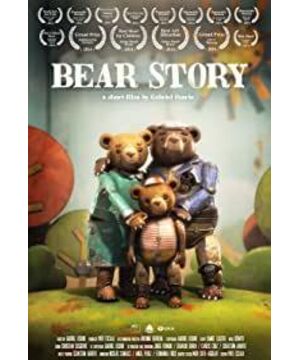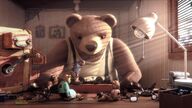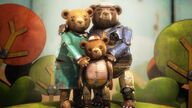Mr. Xiong, you are not an old classmate without
a story. The outline of "Bear's Story" is not complicated: a happy family of three, Mr. Xiong, Mrs. Xiong and Baby Bear live a simple and happy life. The sudden appearance of the circus sent a trapper to attack their apartment, arresting Mr. Xiong and many of his animal neighbors for a brutal circus performance. Mr. Xiong kept forbearing in the long suffering, and finally found a chance to escape the clutches of the circus. When he opened the door again, it was already a bear. In the years that followed, Mr. Xiong made an ingenious mechanical box and walked around the streets as a street art performance. Mr. Xiong recounted his own story in this diorama, but gave every child who watched the story a happy ending. However, his own reunion remains elusive.
I saw this animated short in a cinema in Chile, where the story takes place. Under the vigorous promotion of the Chilean Ministry of Culture, all theaters will screen "Bear's Tale" for free before each recent feature film. In a dark movie theater in the hinterland of San Diego, under a small screen, amid the frolicking sounds of children one after another, I was supposed to be watching a comedy, and I vaguely heard suppressed breathing and low-pitched murmurs.
The intensity of this feeling is slightly different from what domestic friends feel. In the comments on movie sharing sites and video sites, many netizens who loved the film interpreted these stories from technical and emotional perspectives, and also had many interesting and insightful views:
"Although Big Bear escaped from the circus, he did not have a family. The end of the reunion. But the big bear still conveys good hope, life is not easy, life must go on, keep love in your heart, and people will be warm."
"No deal, no harm, love animals and oppose all cruelty to animals"
"The metal mechanical style is relatively unique, and it matches the tone of the story very well. It is cold and restrained, but it is full of hope because of the metal story box."
...
Similarly, many netizens mentioned that the story "contains political metaphors". The simplicity of this Oscar-worthy story makes it almost impossible to believe that what he's trying to convey is the narrative itself. Mr. Xiong, who returned to China with honors, how could there not be a metaphor that goes back and forth under his flat cap.
Grandpa Bear and the Big Circus
South America actually has only one kind of big bear called "Andean bear", also known as "glasses bear" because of the light-colored patterns on its eyes and neck. It has a ferocious temperament and looks cute. I didn't think about it at all when casting. Because this emotional Mr. Bear is not a "metaphor" but a direct protagonist of a family tragedy, he is the director's grandfather, Leon Bordeaux Osorio. The story takes the bear as the protagonist because the grandson's surname "Osorio" hides a "bear (oso)" in it. This animation is a gift from Gabriel to Grandpa, "I will tell you what you have experienced."
Grandpa Xiong is 86 years old this year, and his experience is very similar to Mr. Xiong in the story. In September 1973, Augusto Pinochet, then the commander of the army, launched a coup d'etat with the navy, air force and police force, shelled the La Moneda Palace, overthrew the Allende government and established a military regime. 17 years of dictatorship. In the impact of this incident on Grandpa Xiong, a team of mysterious people rushed into his house, punched him hard in the stomach, and caught him who was knocked unconscious into the car.
The "circus" to which these mysterious people belonged later had an official name called "Chilean National Intelligence Service", which was later replaced by "Chilean National Information Center". This organization is a secret police force established by Pinochet. It started secret activities in 1973 and was formally established the following year. It is responsible for arresting and torture of people with different political opinions. The main targets are Allende's personal friends and guards, revolutionary Left-wing movements, the Socialist Party of Chile and the Communist Party of Chile, etc. As a result of their activism, tens of thousands of Chileans were arrested, either openly or secretly, more than 4,000 were killed, and many more were exiled abroad. That's an astronomical figure for Chile, which today has a population of less than 20 million.
Grandpa Bear is one of them. After being knocked out and dragged away, Leon Puerto Osorio was placed in a Chilean public prison for two years and three months. According to the old man's recollection, he was very fortunate to meet a kinder person with a bottom line in the secret police, so although he lost his freedom, he did not suffer too much torture and life-threatening. A secret policeman once said to him: "Although I have strong political beliefs (following Pinochet), I do not think violence, torture and murder are necessary, and I will not kill."
Many contemporaries Human luck is much worse. Spanish priest Antonio Ido was taken away by the secret police in the autumn of 1974 on the grounds that he was "close to the guerrillas of the revolutionary left movement" and never returned to his parishioners; farmer Flabio O. Yasun and his five-month-pregnant girlfriend, Cecilia Pohanik, were taken away and executed in secret in the same year, when their eldest son was just over a year old; two years later, Washington's former ambassador to the United States, Orlando Le Trier died in a car bomb...
and Grandpa Bear's "good luck" only outweighed the people who were killed. After leaving the public prison, in order to avoid arrest and persecution, he had to live in exile in England for many years. Although he also has his own experiences and gains, the feeling of being far away from his homeland and having a hard time returning to his home has accompanied him almost throughout his prime. Three of his four children now live in Europe, while Gabriel's father, who remained in Chile, died early. The old man did not see his son for the last time, and he also missed his grandson's entire childhood. That heavy era left a deep imprint on the Osorio family, and left the same shadow on thousands of Chilean families.
There is a small detail in "Bear's Story": in the mechanical box, there is only one lock on the door of the bear's house in Mr. Xiong's memory; in fact, there are three dense rows on the door of the bear's house. Although that era is long gone, the sound of footsteps and knocks on the door of the "big circus" in my heart may be difficult for young people who have not experienced the 70s to understand.
Little people in big times
The Oscar is not Mr Xiong's first international accolade. Before that, the animation has won dozens of international awards. But in Chile, "Bear Tale" is not one-sided flowers and applause. Unlike Chinese audiences, Chileans will not have much problem in understanding the actual content of this work, and even appreciate the efforts and animation techniques of young directors. The biggest difference is that this award-winning story appears. In how to evaluate the big times behind this little story, focus on how to treat one name - Augusto Pinochet.
Pinochet, who has been in the army for more than half his life, is undoubtedly a tough and iron-blooded figure. In the coup d'état that shocked the world, he has maintained the same hard and cold face in his more than ten years of dictatorship. But in the eyes of different people, the poker face of the great dictator has a completely different meaning.
Chile ushered in a long and oppressive era after Pinochet took office as president of Chile's military junta in 1973. Under Pinochet, the left-wing political parties, former government members and dissidents were attacked and purged by unscrupulous means, and what happened to Grandpa Xiong can only be regarded as a mild example. Threats, kidnappings, torture, murder... The oppression and despair pervading society has even affected the Chilean language system. Writers try to use more obscure words and techniques to describe the times, and make greater efforts not to be punished for their words.
From a macroeconomic point of view, this era is an era of unprecedented rapid development. On the eve of the coup, Chile under Allende was on the brink of economic collapse. In the concise chronicle edited by former Chilean President Piñera, the title drawn up for 1970-1973 was "Inflation up to 1000%". Due to the large-scale adoption of planned economic policies, the nationalization of a large number of industries has hurt the sustained momentum of economic development. The drop in international copper prices has made economic and people's livelihood even worse. After the coup, Pinochet actively developed the market economy, convened the famous "Chicago Boys" to carry out drastic economic reforms, and achieved good results. According to statistics, between 1973 and 1990, Chile's GDP increased by more than 35%. If we only talk about the economy, Chile's thriving in Latin America today is the solid foundation laid in the past 17 years.
Such a controversial figure before and after his death has brought 17 years of complex, painful and embarrassing time, and the influence has not disappeared in Chilean society so far. After "Bear's Tale" won the Oscar, the response of Chileans went far beyond being happy, liking it online and sharing it with friends, but continued fermentation in Chilean society, and even made a tumultuous sound.
Not long after the news of the film's award came to Chile, the NGO "Federation of Former Political Prisoners of Santiago" gathered in front of the La Moneda Palace, the presidential palace, shouting the slogan: "We are all Mr. Xiong and Ms. Xiong!" Come on, the Pinochet government did harm to them not only by depriving them of their liberty for a period of time and at risk of persecution and even murder, but also by letting them escape to find that they had lost everything: knowledge , Time, Occupation, Income... Today, most of the old former political prisoners need, in addition to the tone of liquidation of the dictator, and the current government to compensate them for the rice bowl.
At the same time, important members of Chilean right-wing parties, such as the National Party, the Independent Democratic Alliance, and the National Renewal Party, made many voices in the media, raising this work to the height of a "political movement". Elmersines Perez, a former member of the Chilean National Party, said in an interview that the animation was favored because of its political orientation rather than its production level, and "doesn't deserve much celebration in Chile." And other dissidents questioned the identity of Grandpa Xiong: Before Allende became president, Leon Bordeaux had followed him as a secretary in the local government. In the chaos of that coup, he should have been a prisoner, not a civilian.
For Chile, of course, that era was a big, turbulent era. Salvador Allende and Augusto Pinochet are big figures in the big era. Their merits and demerits will naturally be constantly commented and discussed in historical research. But whether it's Mr. Xiong in the animation, or the old grandpa Xiong, the priest, the farmer... and every ordinary person who was knocked on the door and taken away, their identities and backgrounds can only be regarded as those in the big era. little people. In the 17 years that a country has grown into a geopolitical power, they have felt fear, pain and sadness. Maybe they also have all kinds of mediocrity, sophistication and even wretchedness, but their existence is still not a price that can be paid casually.
They need to be remembered, they need to be compensated. This 10-minute animation is for my grandfather and for that era.
View more about Bear Story reviews







